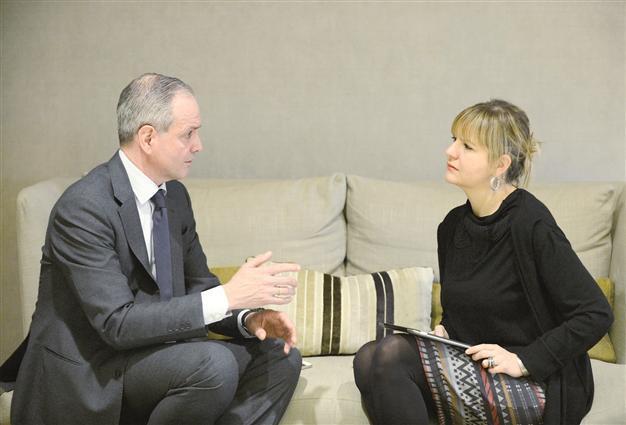US, Turkey relations like old marriage, no longer a love affair, says American analyst
Cansu Çamlıbel ISTANBUL

Michael Werz (L), senior fellow at US think tank Center for American Progress, speaks during an interview with daily Hürriyet reporter Cansu Çamlıbel. HÜRRİYET photo, Levent KULU
Washington reviews its relations with Ankara as divergences in regional policy approaches and Turkish leaders’ anti-U.S. rhetoric disrupts ties between the two allies, a senior American analyst has said.
“It [Turkey-U.S. relations] feels like a marriage that has gotten a little old. It is not a real love affair anymore,” Michael Werz, senior fellow at U.S. think tank Center for American Progress, told daily Hürriyet.
“There is a lot of grumpiness and the partners are not really happy with each other anymore.”
The analyst further said Washington is in the process of reassessing its relations with Ankara, “because there have been a lot of disappointments.”
Ankara’s refusal to allow the U.S. to use İncirlik Air base is of great concern to American military planners and seems like the top priority issue at the table right now, according to Werz.
In addition to the Turkish government’s reluctance to take part in the U.S.-led coalition against the Islamic State of Iraq and the Levant (ISIL) and “not living up to its NATO obligations” by not letting the U.S. fully use İncirlik, Washington is upset about “one side of that marriage talking a lot about the internal relationship in public in a way that is not healthy,” according to Werz.
“The U.S. government was twice forced to correct the record after Turkish government statements misrepresented the contents of internal conversations between Turkish and U.S. officials – this is quite extraordinary among close allies,” he said.
When asked about those occasions, Werz said Washington felt that the Turkish government had misrepresented a conversation about Fethullah Gülen, a U.S.-based Islamic scholar, between U.S. President Barack Obama and President Recep Tayyip Erdoğan, who was prime minister at the time.
“This was a strong indicator that trust is eroding, that the Turkish side was changing the transcript, so to speak. That is one reason, along with real policy disagreements, why people within the U.S. government and the Washington think tank community have begun to re-assess the U.S.-Turkey partnership,” he stated.
Werz also suggested that Erdoğan’s constant attacks on the role of the U.S. in the region further disrupts the two countries’ relationship, also recalling Erdoğan’s vocal criticism of former U.S. Ambassador Frank Ricciardone, who he even threatened to expel from Turkey in late 2013.
“How is this bilateral relationship supposed to work if the main representative of the U.S. is accused of being part of conspiracies and confronted with a very unpleasant situation where he has to rectify inaccurate claims that have been made in public?” Werz said.
“Turkey is still an important partner and is located in an important geographic area. But at the same time, it is clear that the relationship has become much more transactional,” he said.
“It is my impression that no one in the White House, the Department of State or the Pentagon is prepared to do Turkey any big favors these days.”
The analyst insisted that he does not foresee a strong chance of ties recovering soon, even predicting that the two countries’ relations will likely face even more challenges after Obama’s term ends.
“Whether it is Hillary Clinton or a Republican president, we can expect the next U.S. administration will be tougher on Turkey than it is now,” he said.
According to Werz, the issue is not related to the personal relations of the leaders. It is rather related to the “Turkish capacity and willingness to be a stabilizing actor in the region, a strong ally in NATO and a strong partner for the U.S.”
He further emphasized that there were three instances that have eroded trust in Turkish capacity, namely how the Gezi Park demonstrations were handled, misreading the situation in Mosul where 49 Turkish Consulate staff were kidnapped by ISIL and the Kobane row, in which Turkey looked reluctant to allocate any capacity to save the town from ISIL.
“In this context, the Turkish government today seems to lack analytical foresight, political pragmatism and intelligence gathering capacity,” he said.
